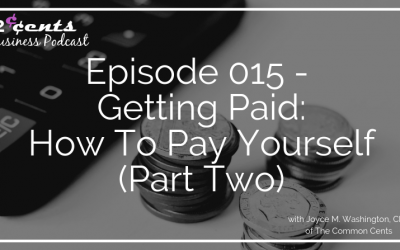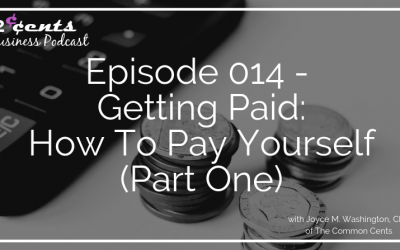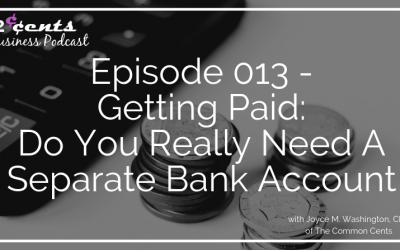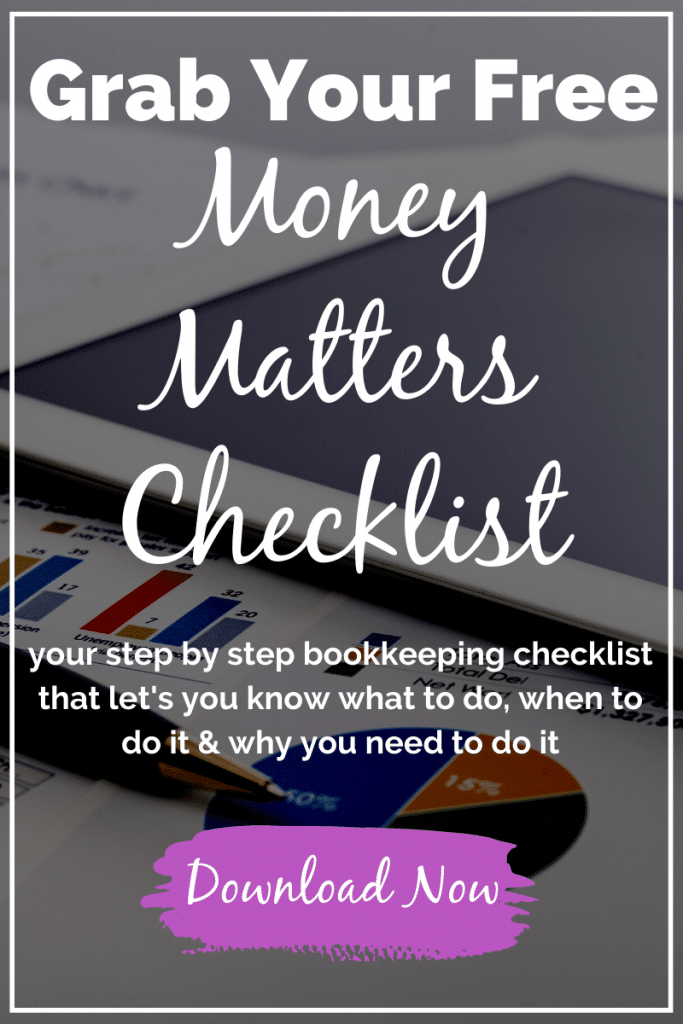Episode 004 – Money & Metrics
Podcast Host
About This Episode
Every Monday is affectionately referred to as Money & Metrics Monday here with Team Common Cents. It’s when we stop and take stock of our progress and make plans for the coming week. It’s also what we do for our clients on Client Time Tuesdays.
Mentioned in this episode:
- The money numbers we check…and it’s more than just keeping an eye on revenue
- The money metrics that we check (and what makes them different than money numbers)
- The 3 things I want you to do
Highlights of this episode:
- 00:41 What do we actually check? RE: money numbers
- 01:13 Why do we check money numbers? Like cash flow, net profit, revenue, and budget versus actual reports
- 03:01 Why you should review unpaid invoices and unpaid bills
- 05:06 What to look at in terms of positive or negative cash flow
- 05:43 What indicators of business health should we all be looking at
- 06:50 What do we actually check? RE: money metrics
- 07:55 Why do we check money metrics? Like pending service agreements, consultations scheduled, conversion rate, website traffic and email signups
- 09:30 How to use your sales conversion rate to set your sales goals & benchmarks
- 11:06 Your Homework: Three Things
- 11:39 First thing – What numbers are the real indicators that show you if you’re getting closer to or further away from your money goals?
- 11:55 Second thing – set an unbreakable appointment with yourself. Treating your business like you would treat a client – set aside some time to work ON your business.
- 13:25 Third thing – Using your numbers and the time you set aside for your business, what actions can you take?
Related topics:
- Numbers to Grow On: The KPIs Every Business Owner Needs To Know
- Budgeting 101
- Accounts Receivable 101
- Accounts Payable 101
- Cash Flow 101
- Budget Versus Actual: How Are You Really Doing?
Remember To Subscribe On: Anchor | iTunes | Spotify | Stitcher
Episode 004 - Money & Metrics: Transcript
0:01
Welcome to Episode Four of the 2 Cents Business Podcast. Hey there, it’s me Joyce, your host and in today’s episode we’re going to talk about the metrics and money numbers that run your business. So let’s get started.
0:17
So among my team and I we we affectionately refer to Mondays and Tuesdays as money and metrics, Mondays, and client time Tuesday’s. These two days of the week are dedicated to the money and metrics for both by business and my clients businesses. So that’s typically all we do on Mondays and Tuesdays.
0:41
So first, I want to check in with the money numbers. So what do we actually check when I when I’m talking about money numbers? What I’m looking for our large transactions, when I’m looking at my clients information, unpaid invoices, and unpaid bills, then we check the clients cash flow, net profit revenue, and we also compare their budget to actual performance.
1:13
Now, here’s why we check each of those. With the large transactions that don’t fit the norm for that business, what we’re looking for is anything that’s relatively large, like I said, for THAT business.
1:28
Because large can be relative but we’re looking at it in the context of that business. And that actual transaction could be a deposit, it could be a check or an expense.
1:43
So it doesn’t matter if it’s a, you know, if it’s large income or large expenses, we’re looking at any large transaction at all.
1:55
And the cause of this extraordinary transaction could be something bad, it could be fraud on the client’s account, or it could be something relatively innocent, like the client for getting to tell you that they launched a new service or product, or it could be that they are planning to do a retreat and they had to write a check for a for a deposit on their venue.
2:25
So that could be the source of the large transaction but you still want to, you know, if it’s your business, you of course, you know, if you’re launching something new, but you still want to be cognizant of anything that’s a large in nature, you still want to be looking at your accounts to make sure that nothing weird is kind of going on.
2:51
So that’s, that’s the first thing that we’re looking at, we’re looking for things that are out of the ordinary for, for that client and for their business.
3:01
And then next up is we look at the unpaid invoices, and the unpaid bills.
3:07
With the unpaid invoices, especially if they’re overdue, we were we want our clients to be paid, and we want to make sure that they’re getting paid. So that’s why we’re looking at the invoices and making sure that there aren’t anything that’s overdue, and if so, we we want to make sure that the client is taking appropriate and timely action, like sending reminder emails. So that’s, that’s what the unpaid invoice pieces about.
3:43
And then with the unpaid bills, and, and, and for a lot of online businesses and entrepreneurs, a lot of things are on auto pay, but I’m for for both myself and my clients, I keep a list of the recurring things that they pay.
4:01
So things like website hosting, email hosting, the various things that they pay every single month, if it’s not paid around the time that I’m expecting it to hit their credit card or their bank account, then in my head, I’m kind of wondering if maybe their credit card has expired and needs to be updated.
4:28
So I will give my client the heads up that that this transaction hasn’t been paid as expected at a certain time in the month and then I will let them know that so that they can take appropriate action because maybe they do need to update their credit card information with their vendor. And they need to find out how they can update that information.
4:56
So far, we’ve looked at extraordinarily large transactions, we’ve looked at unpaid invoices and unpaid bills.
5:06
So next up, I typically look at the clients cash flow. Do they have a positive cash flow, I look at their net profit to date, because you are in the business to make money. So you do want to net profit, I look at their revenue growth or shrinkage look at where they are for this year versus last year.
5:29
And then I also look at their budget versus actual report. And, you know, if they’re budgeting to be at a certain income level, or if they’ve budgeted to have certain expenses that aren’t paid yet, then what’s going on? Do we need to adjust their budget or do they need to adjust their their plans and adjust their budget.
5:53
So again, those are the numbers and the reports that I look at. Now, all of these are indicators of the business’ health and ultimately what we want is to make sure that the client is making money and not losing money. And if they are losing money, or if they aren’t close to their projected goals, by knowing where they stand sooner than later, they can take appropriate action and do some course correcting.
6:22
So that’s kind of why we look at, um, you know, like revenue growth or shrinkage and, and we also look at the budget versus actual report because that is kind of an indicator of, you know, how close you are to your projected goals.
6:41
So, again, I’ve written a few blog posts about these topics. And you can find links to those in the show notes.
6:50
So after we kind of look at those those things, the next thing that we look at, or the next level of metrics are the ones that are more specific to me in my business. However, I do advise my clients and kind of help them to figure out which ones that they want to track in their business. And they have similar ones. And I call these money metrics because they aren’t cash per se, but they do lead to cash.
7:20
So and you’ll see what I mean by that in a minute. And like I said, I review these on Monday. So knowing these numbers actually helps me to plan my week. And again, you’ll understand what I mean by that in a second.
7:34
So here then here are the money metrics that I check in my business: I check the number of clients that I have, pending service agreements, number of scheduled consultations for the week, my consultation conversion rate, as well as website traffic and email signups.
7:55
Now here’s why each of those numbers is important. With the number of current client, what that kind of tells me is that if it has increased or decreased. If it’s increased, I know that there are probably new clients that need to be on boarded, and we need to schedule that accordingly.
8:12
And if it has dipped a little bit, then I know that there are some former clients that probably need to be off boarded. And maybe that requires us to have a close maybe that requires us to have an appointment to close off or to complete the project.
8:34
Do I have pending service agreements? With that, do I need to do some follow ups or am I the bottleneck and I need to counter sign a pending service agreement?
8:49
Then next up is scheduled consultations for the week. The main reason why I want to know how many consultations I have for the week is I like to do prep work. I like to know who I’m going to be talking to. So before the consultation, I’ll go into my scheduling software and review the questionnaire that they fill out so that I can get to know them a little bit beforehand. So it’s it kind of shortens the time that I spend asking questions about them and their businesses. So I do a little bit of research beforehand.
9:30
And then next step is my conversion rate. Now this number is a number I just like to keep my eye on, it’s probably not a number that everybody watches. But I keep an eye on it. Because in the long run, it kind of helps me to figure out how I’m going to achieve my revenue goals for my business. So for instance, if I wanted to onboard two new clients this month, and I know that my conversion rates is 25% then I know how many people I need to talk to or I know how many consultations I need to put on get on my calendar in order to get to those two clients. So in this example where I said my conversion rate is 25% I know that I need to talk to eight potential clients I need eight appointments to get to the desired two people so that’s the conversion rate and why I like to keep an eye on it.
10:38
And then next up is my website traffic and my email signups and to be completely honest, and in full transparency I admit that these two numbers are numbers that I don’t do a whole lot with at this point. But I do monitor both of them, so that I’ll have a baseline for when I am ready to tackle more email marketing stuff and SEO stuff.
11:06
So that’s a lot of numbers, right? And now on that we know what I check for both myself and some of the things that I checked for my clients, I want you to do three things, I want to to give it some thought. And outside of that first list of money numbers that I checked for everyone, look at the metrics that you want to attract the numbers that impact your revenue goals.
11:44
What numbers are the real indicators that show you that you’re getting closer to or further away from achieving your business’ money goals. So that’s the first thing.
11:55
The second thing is, as I mentioned in Episode Two: Fall In Love With Your Business, I treat my business as if it’s a client and I want you to do the same what I want you to do is to make an unbreakable appointment with yourself to check in with your numbers every week. And if you can’t do every week, every other week, or at least twice a month, maybe you do it on the first in the 15th but for me, I like to do it at the beginning of the week on Mondays, hence money and metrics Mondays instead of at the end of the week on Fridays, because sometimes I do work over the weekends. So checking in with my numbers on the first thing, it being the first thing I do on a Monday morning kind of doubles as an opportunity for me to review the prior week and plan for the coming week.
12:54
But that’s just how I do it in my business. And you are welcome to schedule it on any day of the week that you want. But um, you know, it kind of depends on your workflow and your work habits. And you know, when you don’t have as much to do in your business. But um, you know, for you Friday afternoons might be a better day to do this check in, it doesn’t matter what day you do it again, what matters is that you do it and that you do it consistently.So that’s number two.
13:25
Number three. The third thing that I’d like for you to do is to take action, once you’ve reviewed these numbers, once you’ve come up with your money metrics, the things that kind of move the needle, the things that are the real indicators of growth in your business. Once you’ve reviewed those numbers, don’t start with just writing them down. I want you to ask yourself, what do they mean? Are they what you expected? If you expect it to have more clients this month? If you expect it to happen, more consultations this month. If that’s what’s required in your business. If you expect it more or then in you don’t have them, what actions can you take to change what you’re seeing.
14:16
So that’s it. Now what do this is just what I do each and every Monday, even on holidays. So like I said, an unbreakable appointment with yourself. So let’s recap and is this kind of mumble jumble.
14:34
So so let’s recap.
14:37
Let’s start with one of the one of the things is to number one is to decide on the metrics that make most the most sense to you. And either make a handwritten list or create a spreadsheet, something that makes it easy for you to track everything in one place so that you can see the movement you can see trends as they start to unfold.
15:02
Number two make an unbreakable appointment with yourself. Treat your business like one of your clients.
15:08
Number three, check your money numbers. And to recap, those money numbers are large transactions that don’t fit the norm for your business. unpaid invoices, unpaid bills, and then checking in with your cash flow, your net profit to date and your revenue growth or shrinkage and the budget versus actual report.
15:10
Number four, check your money metrics. And yours may be different than mine. But these are the ones that I check. I check the number of current clients that I have pending service agreements, number of scheduled consultations and keep an eye on my conversion rate. And it also keep an eye on my website traffic and email subscribers.
16:00
Last but not least number five is to review the numbers and take some action.
16:08
So that’s it five things you know. So if you have enjoyed this episode, and you’d like to hear more, I would absolutely love it if you subscribed. And if you have any questions that you’d like me to answer on an upcoming episode send me an email to [email protected] which you will also find in the show notes.
16:31
So thanks for listening and have a fantastic money and metrics Monday.




